Top 10+ Healthcare CRM Softwares for Medical Practices in 2025
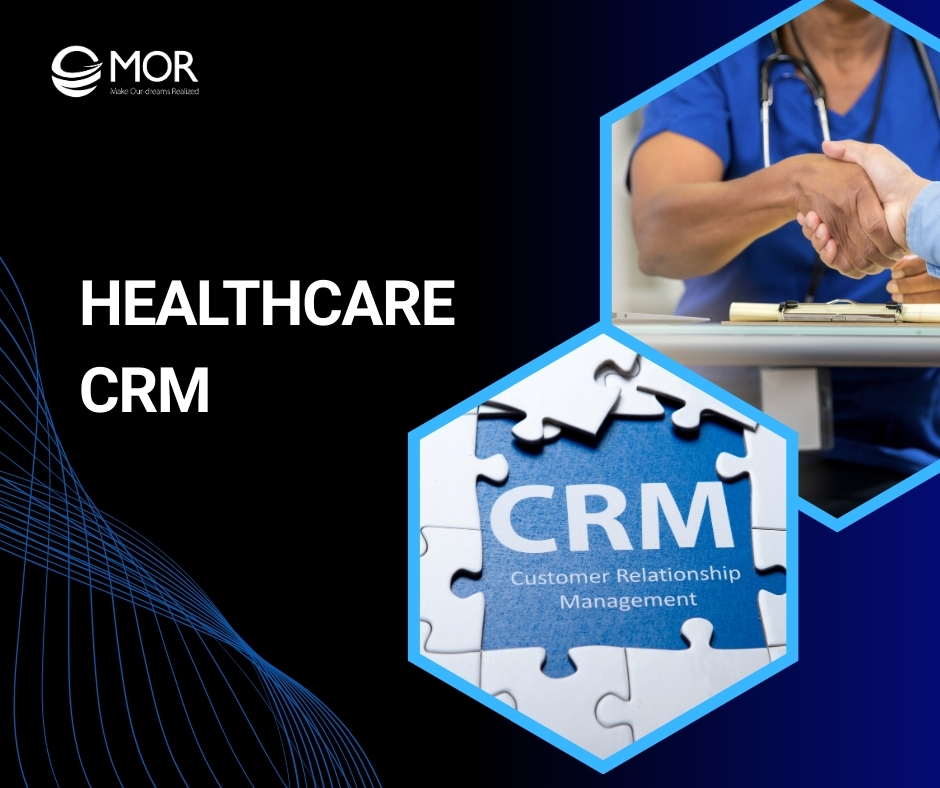
Choosing the right healthcare CRM can feel overwhelming when every platform promises smoother workflows and better patient care. Many providers still struggle with fragmented systems, compliance risks, and wasted time on manual tasks. This guide from MOR Software will walk you through the best options, comparing tools built to fit the real needs of modern medical practices.
What Is A Healthcare CRM?
A healthcare CRM is a specialized system that enables clinics, hospitals, and other medical providers to manage communication and engagement with patients, insurers, and related partners. It centralizes data, automates touchpoints, and supports HIPAA compliance, all with the goal of improving both patient and staff experiences.
In 2024, U.S. health authorities reported that 69% of people managing a chronic condition accessed their health information online at least once. This shows the need for tools that organize and connect these touchpoints.
Beyond simple record-keeping, healthcare CRM software is designed to build stronger patient loyalty. By tracking interactions and offering timely reminders, it encourages patients to follow prescribed treatments, continue care with trusted providers, and strengthen long-term relationships that directly support better clinical results.
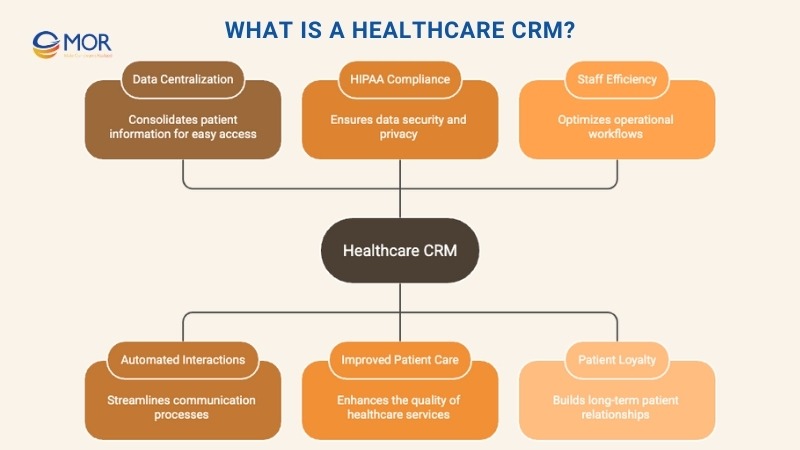
What Is A Healthcare CRM?
Key Benefits Of Healthcare CRM
Adopting a healthcare CRM comes with measurable advantages for both providers and patients. These systems not only improve internal efficiency but also help build trust and loyalty through secure, streamlined communication and personalized services.
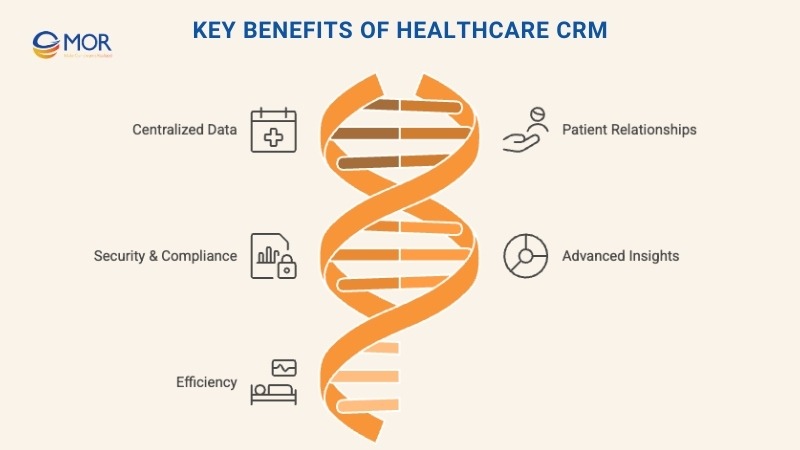
Key Benefits Of Healthcare CRM
Centralized View Of Patient Data
A healthcare CRM software platform brings together medical records, appointment schedules, and patient communications into one accessible hub. This centralized approach gives doctors and staff an organized view of each individual’s history, contact details, and preferences.
Clinicians can review relevant details before visits, share approved information with colleagues, and make informed care decisions faster. With this complete picture, providers design treatment plans that match each patient’s needs, while also maintaining accurate, compliant records across the organization.
Building Stronger Patient Relationships And Retention
Using CRM in healthcare industry operations makes it easier to deliver consistent, personalized care. Automated reminders for appointments or test results help patients stay engaged and feel supported throughout their health journey.
These reminders, paired with tailored follow-up plans, build confidence in providers and increase the likelihood of patients continuing care with the same practice. In a randomized study covering more than 150,000 visits, sending one additional text reminder cut missed appointments by 7% in primary care and 11% in behavioral health.
In the long term, such meaningful interactions strengthen loyalty, raise satisfaction, and improve retention without adding extra administrative burden on medical staff.
Security, Privacy, And Compliance
A healthcare CRM must operate under strict security protocols and follow regulations like HIPAA to safeguard patient information. These safeguards reduce exposure to breaches and support full compliance with industry standards, giving patients, providers, and partners confidence in the system.
Through using CRM healthcare platforms that prioritize privacy, organizations meet user expectations for safety while continuing to deliver consistent, high-quality services. The scale of today’s risk is clear, HHS reports that the Change Healthcare cyber incident led to about 100 million individual notices in 2024.
Advanced Insights Into Patient Experiences
Modern healthcare CRM software development often includes analytics tools that track behaviors and generate detailed reports. These insights highlight patient needs, engagement levels, and care patterns, helping teams design better services and allocate resources more effectively.
With this level of intelligence, healthcare organizations can raise care quality, improve satisfaction, and achieve stronger outcomes across their practices.
Reduced Patient And Team Bottlenecks
A healthcare CRM makes it possible to cut down delays by automating many administrative duties and streamlining workflows. Instead of relying on manual updates, the system manages tasks such as securing pre-approvals, adding payers into the coverage process, and reducing possible conflicts down the line. Patients can also pre-register for upcoming visits and receive reminders to refresh details in their records.
For staff, these improvements ease scheduling pressures, speed up communication, and simplify coordination between departments. Using a medical CRM to handle repetitive work, providers free up time to focus on direct patient care, leading to faster responses and smoother day-to-day operations across the entire practice.
Prior authorization alone averages 39 requests per physician per week and consumes roughly 13 hours, and most physicians say it causes care delays. This is where workflow automation can help.
Top 13 Leading Healthcare CRM Softwares In 2025
Any healthcare CRM software must help teams focus on patient relationships while staying compliant with HIPAA rules and safeguarding sensitive data. Below is an overview of some of the strongest options available in 2025.
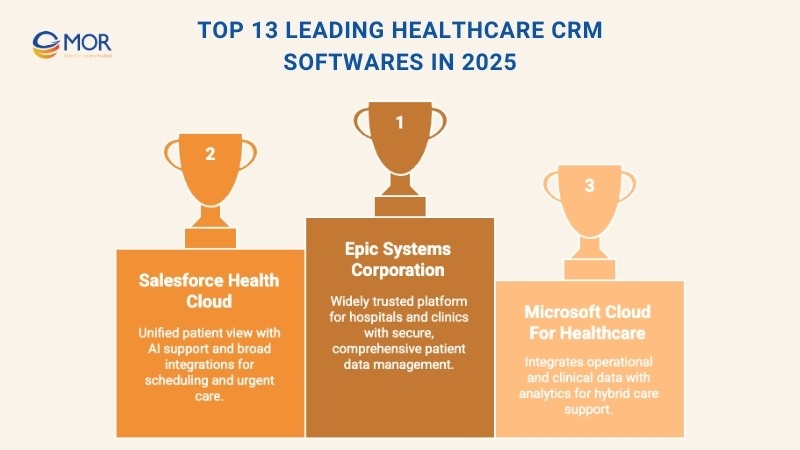
Top 13 Leading Healthcare CRM Softwares In 2025
Epic Systems Corporation
Epic Systems, widely known as Epic, provides one of the most established platforms in the market. It is trusted by hospitals, rehab centers, hospices, and urgent care facilities for managing patient data and communication. Patients can search for services, schedule appointments, and view treatment plans, while providers share information across the Epic Health System Community. This global network ensures centralized data management and collaboration.
Through Epic’s CRM for healthcare, medical teams can align on care strategies, manage resources, and improve billing processes. Patients benefit from self-service features through desktop or mobile portals, which give them transparent access to records and clear updates about their care journeys.
Features:
- Unified data storage
- Patient profiles
- Reporting and analytics tools
- Configurable workflows
- System integrations
- Voice-enabled functions
- Patient access portal
- Medical form templates
Pros | Cons |
• Centralized and digitized health records • Real-time communication between patients and providers • Meets HITRUST security standards | • Requires technical skills to operate and maintain • Limited integration with third-party systems |
Pricing: Pricing details are available directly from Epic Systems upon request.
Salesforce Health Cloud
Salesforce Health Cloud is a cloud-based healthcare CRM that gives providers a single, unified view of each patient. With it, medical teams can identify care gaps, manage referrals, and provide self-service tools for patients. The platform also supports urgent care access, mental health services, and connections to crisis centers. Scheduling tools include multi-participant appointment booking, automated workflows, and waitlist management to keep operations smooth.
This CRM for healthcare providers connects with EHR systems and existing applications, but many organizations find that they need multiple integrations to achieve full functionality. Maintaining and customizing these connections often requires technical expertise and higher costs, making the system powerful but complex.
Features:
- Unified data storage
- Patient and customer profiles
- Reporting and analytics
- Automated workflows
- Broad integrations
- Care management tools
- Interoperability options
- AI add-ons
Pros | Cons |
| • Wide range of add-on tools, including Einstein AI • Built-in insurance and care management support | • Higher cost compared to other healthcare CRM solutions • Requires up-to-date mobile and desktop software for smooth performance |
Pricing: Plans begin at $325 per user each month, billed annually. A 30-day free trial is offered.
Zoho For Healthcare
Zoho began offering solutions for the healthcare sector in 2015. Since then, Zoho for Healthcare has expanded to cover many functions of a healthcare CRM, from telecalling and home care coordination to lead tracking and follow-up reminders. Departments can also use the platform to share patient referrals and deliver lab screening results within one centralized system.
The platform supports post-visit summaries and consolidated billing, giving providers a way to update patients on care plans, overdue balances, or pending records. During onboarding, staff can collect information through digital intake forms, while the system securely stores consent forms to maintain compliance. An integrated scheduling tool also allows clinics across multiple sites to manage bookings, queues, and resource allocation efficiently.
Features:
- Unified data storage
- Patient and customer profiles
- Reporting and analytics
- Workflow automation
- System integrations
- Scheduling tools
- Electronic medical record support
- Patient communication features
Pros | Cons |
• Built-in intake and consent form templates • Encourages team collaboration across departments | • Requires dedicated solutions team for integrations • HIPAA compliance not included by default |
Pricing: Contact Zoho directly for pricing details.
Microsoft Cloud For Healthcare
Microsoft Cloud for Healthcare is a cloud-based service that works as a healthcare CRM software extension within the Microsoft ecosystem. It enables providers to draw insights from operational and clinical data, helping them make better decisions using both patient records and organizational trends. The system also supports coordinated appointment scheduling and generates treatment plan suggestions based on centralized information.
Its information management tools allow providers to operate with hybrid care frameworks, covering both in-person visits and remote services. With omnichannel experiences, care teams can connect with patients on their preferred platforms. Microsoft Cloud for Healthcare also lets organizations set access rules for aggregated health data while monitoring prevention efforts and tracking population health patterns. This makes it a strong option for those looking for a CRM for medical practice that integrates securely with existing Microsoft products.
Features:
- Centralized data storage
- Patient and customer profiles
- Analytics and reporting
- Workflow automation
- System integrations
- Supply chain planning
- Information management tools
- Threat protection features
Pros | Cons |
• Wide range of healthcare-specific tools, including Microsoft Fabric • Suitable for providers, insurers, and life science organizations | • Requires Microsoft 365 or Azure as a base • Full compliance depends on using additional Microsoft platforms |
Pricing: Add-ons start from $95 per user each month.
Healthgrades
Healthgrades is a healthcare CRM software solution tailored for health systems, life science organizations, and large medical practices. It enables care teams to design workflows for patient communication and provides access to a large pool of people actively seeking healthcare services.
The platform includes scheduling and data capture tools that support both providers and patients throughout the care journey. Teams can also use physician search pages and provider profiles to enhance visibility. Meanwhile, the Healthgrades Quality Team reviews organizational outcomes and clinical performance, giving practices the ability to pinpoint service improvements and measure patient results. This makes it a valuable CRM in healthcare industry settings that focus on both growth and quality.
Features:
- Unified data storage
- Patient and customer profiles
- Analytics and reporting
- Workflow automation
- Integrations
- Medchat·ai functionality
- Healthgrades Quality Team oversight
Pros | Cons |
| • Medchat·ai comes HIPAA compliant • Strong focus on quality tracking and care management | • Integrations are available but limited • Patient profile tools are not as detailed as competitors |
Pricing: Contact Healthgrades directly for pricing details.
Optum
Optum, a subsidiary of UnitedHealth Group, delivers healthcare CRM software designed to help providers manage patient care across the entire health ecosystem. The platform supports resource allocation for high-risk populations and enables organizations to monitor and improve both clinical and financial outcomes.
With Optum’s CRM for doctors and care teams, workflows can be created to manage tasks and design targeted intervention strategies. The system also centralizes access to clinical and claims data, covering demographic, behavioral, and patient-reported details. Partner integrations expand functionality, offering extra guidelines and tools that connect directly with platforms such as United Healthcare.
Features:
- Centralized data storage
- Patient and customer profiles
- Reporting and analytics
- Automated workflows
- Integration options
- Communication tools
- Partner resources
- Care planning support
Pros | Cons |
| • Includes pre-built assessment programs • Provides additional services like Analytics Performance and Clinical Operations | • Requires technical skills for full interoperability • Some data access depends on costly external enclaves |
Pricing: Contact Optum for pricing information.
Trella Health
Trella Health offers a healthcare CRM software platform built for the post-acute care market. It leverages referral data, market insights, and performance transparency to help providers streamline sales processes. The platform also integrates third-party information from Medicare Advantage, commercial plans, and Medicare Fee-for-Service claims to provide a comprehensive view.
The solution delivers specialized tools for home health, hospice, and nursing care organizations. Teams can use GPS mapping to track referral locations, log sales activity, and manage new opportunities in one place. With built-in expense tracking, mobile reporting, and EHR integrations, Trella Health acts as a single dashboard where providers can review patient information and optimize workflows across care settings. This makes it a practical CRM for healthcare businesses focused on post-acute services.
Features:
- Unified data storage
- Patient and customer profiles
- Reporting and analytics
- Workflow management
- Integration options
- Mobile app access
- Expense tracking tools
Pros | Cons |
• Mobile app designed for field teams • Reporting tailored to post-acute care organizations | • Limited to post-acute care use cases • Workflows and scheduling require switching between screens |
Pricing: Contact Trella Health directly for pricing.
FreeCRM.com
FreeCRM.com, also known as HIPAA CRM, is a web-based solution tailored for healthcare organizations. It offers flexible licensing models including on-demand, private label, and custom options. As a HIPAA-compliant healthcare CRM, it helps providers manage patient data securely, minimize redundancy, and maintain regulatory compliance while controlling access rights for authorized staff.
This patient relationship management software also supports tracking contact details, medical history, appointments, and billing records. Through centralized dashboards, teams can monitor operational metrics and patient data in one place. Users can easily access, update, and share records without toggling between separate systems, improving both accuracy and efficiency.
Features:
- Unified data storage
- Patient and customer profiles
- Reporting and analytics
- Workflow tools
- Integration support
- Lead management
- Web form creation
Pros | Cons |
• Customizable setup options • Offers a forever-free plan | • Requires Zapier for multiple integrations • Base options are limited and need configuration |
Pricing: Paid plans begin at $10 per month, while a free version with limited features is also available.
Bitrix24
Bitrix24 provides a flexible healthcare CRM solution that enables organizations to manage patient interactions, track performance data, and streamline daily operations. It includes tools for monitoring patient activity, inventory control, e-signatures, and sales metrics. The platform also supports telehealth through built-in video calls and conferencing, while its Contact Center stores communication history and allows teams to connect with patients across multiple channels.
With this CRM for healthcare, providers can customize forms, fields, and automation features to match their workflow needs. Teams can schedule reminders via email or chat, configure notifications based on patient status, and even transcribe calls or use prepared collection forms. Documentation management is also simplified with centralized online storage, ensuring that patient records remain secure and accessible.
Features:
- Centralized data storage
- Patient and customer profiles
- Reporting and analytics
- Automated workflows
- Integration options
- Contact Center support
- Product catalog management
Pros | Cons |
• Can be self-hosted for added control • Includes two-factor authentication | • Free plan comes with limited functionality • HIPAA compliance requires AWS hosting |
Pricing: Paid plans start at $49 per organization per month (up to five users), billed annually. A free version and a 15-day trial are also offered.
Creatio
Creatio is a no-code healthcare CRM platform first introduced in 2014. It provides a unified database that enables departments to share information and manage activities seamlessly. The system can also identify market shifts or new trends, helping organizations adapt retention strategies as conditions change.
With CRM healthcare tools from Creatio, teams can monitor patient journeys, track sales pipelines, and organize records by funnel stages or other custom categories. Users can connect with patients across various channels, review past interactions, and gain insights into behavior and preferences. This makes it easier to personalize communication while ensuring data is consistently accessible and actionable.
Features:
- Centralized data storage
- Patient and customer profiles
- Analytics and reporting
- Workflow automation
- System integrations
- No-code customization options
- CRM modules for flexibility
Pros | Cons |
• No-code setup for easy customization • Includes business process management functions | • Limited out-of-the-box integrations • Pricing rises when adding marketing, sales, or service modules |
Pricing: Plans start at $25 per user each month, billed annually. A 14-day trial is available.
FreeAgent CRM
FreeAgent CRM is a HIPAA-compliant healthcare CRM software built for clinics, life sciences, biotech, and pharmaceutical organizations that manage sensitive health information. It helps providers stay compliant while offering tools for practice management and lead tracking.
The system delivers a comprehensive patient view, covering medical history, appointments, and treatment records. With this CRM for medical practice, organizations can design automated follow-ups, create campaigns based on clinical rules, and use task lists that prioritize referrals. Care teams also benefit from streamlined communication across departments, updated patient profiles, and performance metrics tracking, all while maintaining strict security standards.
Features:
- Centralized data storage
- Patient and customer profiles
- Reporting and analytics
- Automated workflows
- Integration options
- Auto-prioritized task lists
- Document management tools
Pros | Cons |
• Works without third-party vendor support • Includes 30-day onboarding assistance | • Free plan limited to 5 users • AI features only available in premium tiers |
Pricing: Paid plans begin at $28 per user monthly, billed annually. A free version and 14-day trial are also available.
Actium Health
Actium Health is a healthcare CRM software that runs on CENTARI, an AI-driven platform built to uncover siloed patient data and highlight engagement opportunities. This tool helps care teams design outreach plans for high-risk individuals while improving how providers use existing data to support patient engagement.
With this CRM for healthcare providers, medical professionals can identify potential patients, track outreach prospects, and measure patient value for targeted campaigns. By combining clinical and behavioral insights, Actium Health strengthens population health strategies and makes it easier for organizations to connect with the right patients at the right time.
Features:
- Centralized data storage
- Patient and customer profiles
- Reporting and analytics
- Automated workflows
- Integration tools
- CENTARI AI platform
- Influence modeling
Pros | Cons |
• AI-powered engagement support • Merges clinical and behavioral insights | • Limited integration capabilities • Primarily designed for at-risk patient groups |
Pricing: Contact Actium Health for detailed pricing.
LeadSquared
LeadSquared is a marketing automation, sales execution, and field force management tool that also provides a HIPAA-compliant healthcare CRM software. It operates under a business associate agreement (BAA) to protect PHI, making it suitable for a wide range of providers, from dental and fertility clinics to hospitals and hospice care facilities.
This top CRM providers solution is designed for patient intake, appointment scheduling, and management. It includes pre-set systems, acquisition tools, and digital forms to help teams capture and track leads. With built-in communication options, providers can deliver reminders, follow-up notes, and educational content to patients directly from one platform. Mobile access adds flexibility, while analytics offer a clear view of patient experiences and acquisition processes.
Features:
- Centralized data storage
- Patient and customer profiles
- Reporting and analytics
- System integrations
- Workflow automation
- Appointment and contact history
- Patient segmentation tools
Pros | Cons |
• Includes low-code customization • Call center capabilities for healthcare providers | • Workflow automation limited to higher-tier plans • Some integrations, like chat, require add-ons |
Pricing: Contact LeadSquared directly for pricing details.
Healthcare CRM Software Comparison Chart
To help you quickly evaluate your options, we’ve built a chart that compares the starting prices, trial availability, and standout features of the leading healthcare CRM platforms covered above.
Software | Starting Price | Free Trial | Key Features |
| Epic Systems Corporation | Contact Epic Systems for pricing | Not available | • Central data storage • Customer profiles • Analytics and reporting • Workflows • Integrations |
| Salesforce Health Cloud | $325 per user/month (annual billing) | 30 days | • Central data storage • Customer profiles • Analytics and reporting • Workflows • Integrations |
| Zoho for Healthcare | Contact Zoho for pricing | Not available | • Central data storage • Customer profiles • Analytics and reporting • Workflows • Integrations |
| Microsoft Cloud for Healthcare | $95 per user/month (per add-on) | Not available | • Central data storage • Customer profiles • Analytics and reporting • Workflows • Integrations |
| Healthgrades | Contact Healthgrades for pricing | Not available | • Central data storage • Customer profiles • Analytics and reporting • Workflows • Integrations |
| Optum | Contact Optum for pricing | Not available | • Central data storage • Customer profiles • Analytics and reporting • Workflows • Integrations |
| Trella Health | Contact Trella Health for pricing | Not available | • Central data storage • Customer profiles • Analytics and reporting • Workflows • Integrations |
| FreeCRM.com | $0 per month (basic plan) | Not available | • Central data storage • Customer profiles • Analytics and reporting • Workflows • Integrations |
| Bitrix24 | $49 per organization/month (annual billing) | 15 days | • Central data storage • Customer profiles • Analytics and reporting • Workflows • Integrations |
| Creatio | $25 per user/month (annual billing) | 14 days | • Central data storage • Customer profiles • Analytics and reporting • Workflows • Integrations |
| FreeAgent CRM | $28 per user/month (annual billing) | 14 days | • Central data storage • Customer profiles • Analytics and reporting • Workflows • Integrations |
| Actium Health | Contact Actium Health for pricing | Not available | • Central data storage • Customer profiles • Analytics and reporting • Workflows • Integrations |
| LeadSquared | Contact LeadSquared for pricing | Not available | • Central data storage • Customer profiles • Analytics and reporting • Workflows • Integrations |
Key Features Of Healthcare CRM Software
Whether you choose a ready-to-use platform or a custom-built solution, certain healthcare CRM features are essential for improving patient care and organizational efficiency.
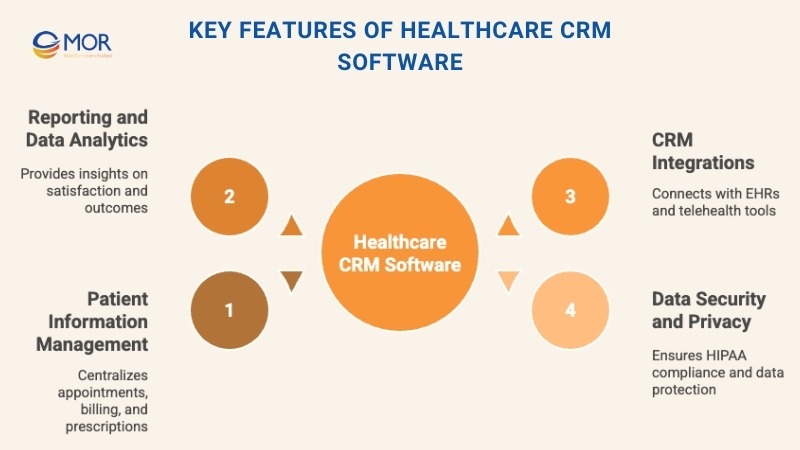
Key Features Of Healthcare CRM Software
Managing Patient Information
A healthcare CRM software system enables providers and staff to manage critical details such as appointments, prescriptions, billing records, and sensitive documents. With these tools, data flows seamlessly across connected systems, making it easier for entire care teams to collaborate.
The platform should support centralized case management, allowing quick updates to patient profiles and records. It must also integrate siloed information from multiple sources, ensuring that every care decision is made with accurate, up-to-date data.
Reporting And Data Analytics
Built-in reporting and analytics give healthcare teams visibility into important metrics like patient satisfaction, attendance rates, and treatment results. These insights empower leaders to make informed choices and find ways to raise service quality while streamlining operations.
Customizable dashboards also make it simple to track patterns and share reports across the organization, supporting both clinical and administrative improvement.
CRM Integrations For Healthcare Providers
An effective healthcare CRM should connect easily with key systems such as EHRs, billing platforms, and telehealth applications. These integrations keep information consistent across departments and improve workflows by letting different healthcare technologies operate together in real time.
For organizations, this means fewer manual updates and smoother coordination between clinical, financial, and administrative teams.
Protecting Data Security And Privacy
Every CRM for healthcare providers must comply with HIPAA and similar regulations to safeguard patient information. To achieve this, platforms should include encryption, strict access controls, and frequent security audits. These protections ensure that sensitive data is stored and shared securely, reducing the risk of breaches while building trust with patients who expect privacy in every interaction.
How To Choose The Right Healthcare CRM
Selecting the right healthcare CRM software requires careful evaluation of several important factors that affect both patient care and organizational efficiency.
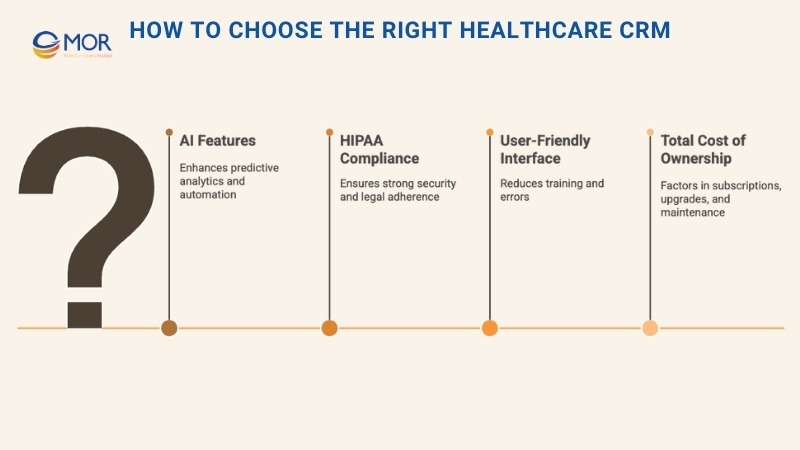
How To Choose The Right Healthcare CRM
- Check for AI features. A strong healthcare CRM should include predictive analytics, automation, and AI-driven tools that boost patient engagement while reducing manual workloads for staff.
- Confirm HIPAA compliance. Security is non-negotiable. Make sure the platform includes HIPAA safeguards like encryption, secure storage, and access controls to keep health records protected.
- Focus on usability. The system should be easy to navigate with an intuitive interface. This reduces training needs and minimizes user errors for busy medical staff.
- Review total ownership costs. Beyond subscription fees, account for upgrades, support, and maintenance. Understanding these expenses upfront helps balance functionality with long-term budgets.
When organizations keep these points in mind while assessing a CRM in healthcare industry, they can choose a platform that supports compliance, efficiency, and positive patient outcomes.
Upgrade Your Patient Experience With MOR Software
Plenty of healthcare CRM platforms promise value, yet many fall short in real-world use. Some carry steep costs or demand technical expertise that smaller teams cannot manage. Others lack proper integrations, leaving patient data scattered across multiple systems. And without guaranteed HIPAA compliance, providers risk gaps in security and trust. These barriers often stand in the way of delivering a consistent and connected patient experience.
At MOR Software, we create healthcare solutions designed around patients and providers alike. From mobile consultation tools to tailored Salesforce Health Cloud integrations, our systems improve every stage of the care journey.
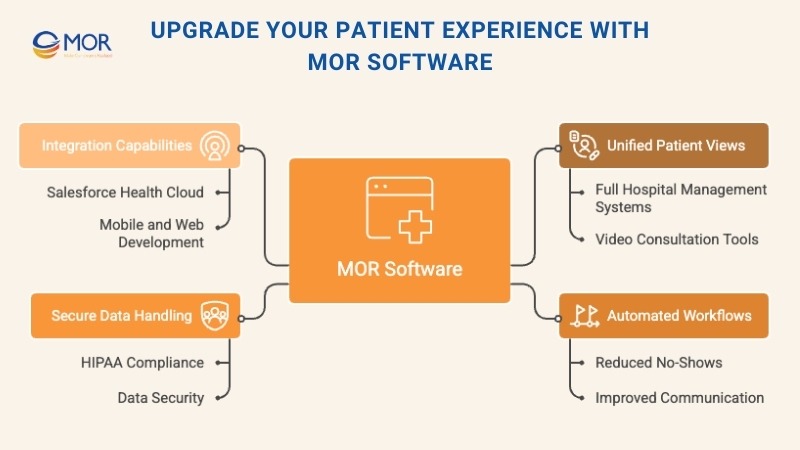
Upgrade Your Patient Experience With MOR Software
We have built full hospital management suites that integrate with medical devices, automate billing, and provide doctors with role-based dashboards. Our video consultation platforms allow patients to book visits, meet with physicians, and receive prescriptions online, reducing clinic overcrowding and opening new pathways for care.
With our focus on CRM, cloud, and data security, providers gain unified patient views, HIPAA-compliant data handling, and actionable insights. This leads to better communication, fewer no-shows, and faster access to quality care.
Our expertise spans mobile, web, and Salesforce development, giving your organization technology that is secure, scalable, and future-ready. Partnering with MOR Software means modernized workflows, stronger compliance, and deeper patient trust.
Conclusion
Selecting the right healthcare CRM helps providers simplify operations, maintain HIPAA compliance, and deliver care that feels connected at every step. With stronger data management and smarter integrations, organizations can improve patient satisfaction and reduce administrative strain. At MOR Software, we design secure, scalable solutions that unify records, support real-time communication, and create lasting value for healthcare teams. Ready to modernize your patient experience? Contact us today to get started.
MOR SOFTWARE
Frequently Asked Questions (FAQs)
What is a CRM in healthcare?
A healthcare CRM (Customer Relationship Management) is a platform built to strengthen patient-provider relationships and improve overall care delivery. It helps streamline administrative tasks, increase efficiency for healthcare staff, and support personalized engagement that leads to higher patient satisfaction.
What are the challenges of CRM in healthcare?
Implementing a CRM in healthcare can be difficult. Common challenges include ensuring HIPAA compliance, adapting the system to unique clinical workflows, managing unrealistic expectations from staff, dealing with limited healthcare-specific reporting features, and allocating enough resources for smooth operation.
Is an EMR a CRM?
No, an EMR is not a CRM. An EMR (electronic medical record) focuses on storing clinical information like diagnoses, test results, and treatment histories. A CRM, on the other hand, manages non-clinical information such as patient interactions, communication history, and billing details.
What is the difference between healthcare CRM and EHR?
Healthcare CRM and EHR serve different purposes. A healthcare CRM is designed to manage relationships, communication, and patient experiences. An EHR (electronic health record) is focused on storing and maintaining medical records, including patient histories and clinical data.
What CRM do hospitals use?
Hospitals often choose from several healthcare CRM solutions, depending on their needs. Popular options include:
- Epic Systems Corporation
- Zoho for Healthcare
- Salesforce Health Cloud
- Trella Health
- Optum
What are the types of healthcare CRM?
Healthcare CRMs typically fall into four categories:
- Operational CRM: Improves day-to-day interactions and streamlines processes.
- Analytical CRM: Uses data insights to enhance patient experiences and optimize workflows.
- Collaborative CRM: Helps different teams share information and coordinate care more effectively.
- Strategic CRM: Supports long-term planning and patient relationship strategies.
These categories also apply when describing the main types of healthcare CRM.
Rate this article
0
over 5.0 based on 0 reviews
Your rating on this news:
Name
*Email
*Write your comment
*Send your comment
1